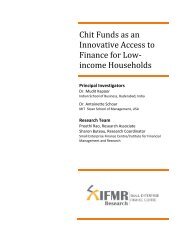Government of India Volume I: Analysis and Recommendations
Government of India Volume I: Analysis and Recommendations
Government of India Volume I: Analysis and Recommendations
You also want an ePaper? Increase the reach of your titles
YUMPU automatically turns print PDFs into web optimized ePapers that Google loves.
18.3. Note <strong>of</strong> dissent by P.J. Nayak<br />
NOTES OF DISSENT<br />
While the Commission’s Report strives to break fresh ground in several directions, <strong>and</strong><br />
particularly in respect <strong>of</strong> Consumer Protection <strong>and</strong> Resolution, there are two approaches<br />
adopted with which I disagree, while otherwise being supportive <strong>of</strong> the Commission’s<br />
recommendations. As both approaches affect significantly the structure <strong>and</strong> conclusions<br />
<strong>of</strong> the Report, I believe their importance necessitates this Note <strong>of</strong> Dissent.<br />
18.3.1. The Finance Ministry as a Financial Sector Regulator<br />
The last 25 years <strong>of</strong> the evolution <strong>of</strong> financial sector regulation in <strong>India</strong> has seen a continual<br />
empowerment <strong>of</strong> regulatory agencies. This began with the transfer <strong>of</strong> powers for capital<br />
markets regulation from the <strong>Government</strong> to a new regulator, SEBI; led subsequently to<br />
the establishment <strong>of</strong> other regulators for commodities, insurance <strong>and</strong> pension funds; <strong>and</strong><br />
has coincided with the increasing empowerment <strong>of</strong> the two principal regulators, RBI <strong>and</strong><br />
SEBI, through periodic amendments to Acts <strong>of</strong> Parliament under which they draw their<br />
powers. This directional thrust in the empowerment <strong>of</strong> regulators established outside <strong>of</strong><br />
the <strong>Government</strong> has brought expertise into financial regulation. It is also now generally<br />
accepted that when the <strong>Government</strong> did regulate directly, as it did for the primary capital<br />
market through the Controller <strong>of</strong> Capital Issues, or the secondary capital market through<br />
the stock exchange division <strong>of</strong> the Finance Ministry, the consequences were sometimes<br />
unfortunate: new capital issues were continually grossly mis-priced, <strong>and</strong> malpractices in<br />
the functioning <strong>of</strong> brokerage firms were commonplace.<br />
The Commission now arrests <strong>and</strong> partly reverses this directional movement, <strong>and</strong> it<br />
is with apprehension that one must view the very substantial statutory powers recommended<br />
to be moved from the regulators (primarily RBI) to the Finance Ministry <strong>and</strong> to<br />
a statutory FSDC, the latter being chaired by the Finance Minister. The Commission has<br />
recommended that direct statutory powers be vested in the <strong>Government</strong> in matters <strong>of</strong> (i)<br />
Capital Controls <strong>and</strong> (ii) Development. The statutory empowerment <strong>of</strong> the FSDC encompasses<br />
(iii) Inter-Regulatory Co-Ordination; (iv) Identification <strong>and</strong> Monitoring <strong>of</strong> SIFIs; <strong>and</strong><br />
(v) Crisis Management.<br />
This transfer <strong>of</strong> powers collectively constitutes a pr<strong>of</strong>ound shift in the exercise <strong>of</strong> regulatory<br />
powers away from (primarily) RBI to the Finance Ministry. The Finance Ministry<br />
thereby becomes a new dominant regulator. To rearrange the regulatory architecture in<br />
this manner, requiring new institution-building while emasculating the existing tradition<br />
<strong>of</strong> regulators working independently <strong>of</strong> the <strong>Government</strong>, appears unwise. There is no<br />
convincing evidence which confirms that regulatory agencies have under performed on<br />
account <strong>of</strong> their very distance from the <strong>Government</strong>; indeed, many would argue that this<br />
distance is desirable <strong>and</strong> has helped to bring skills (<strong>and</strong> a fluctuating level <strong>of</strong> independence)<br />
into financial regulation.<br />
The concept <strong>of</strong> a statutory FSDC, <strong>and</strong> the functions sought to be vested in it, are sensible<br />
provisions <strong>and</strong> will provide much needed co-ordination between regulators, as also<br />
the ability to steer the financial sector through periods <strong>of</strong> systemic risk. What is worrisome<br />
is that the chairmanship <strong>of</strong> FSDC is with the Finance Ministry, as this could lead to<br />
a government creep into the micro-prudential powers <strong>of</strong> other regulators. At present,<br />
without statutory powers, such a creep is difficult. As an uneasy compromise, the Commission<br />
has recommended (in Table 9.3) that an Executive Committee <strong>of</strong> the board <strong>of</strong><br />
FSDC be constituted which will be chaired by the regulator for banking <strong>and</strong> payments<br />
[read Governor RBI], with managerial <strong>and</strong> administrative control, which will refer decisions<br />
to the board <strong>of</strong> FSDC when the Committee is unable to reach a consensus. It is unlikely<br />
that this would constitute an adequate buffer against <strong>Government</strong> creep. A superior<br />
way <strong>of</strong> combining the needs <strong>of</strong> efficient co-ordination, the management <strong>of</strong> systemic risk<br />
150 FINANCIAL SECTOR LEGISLATIVE REFORMS COMMISSION



